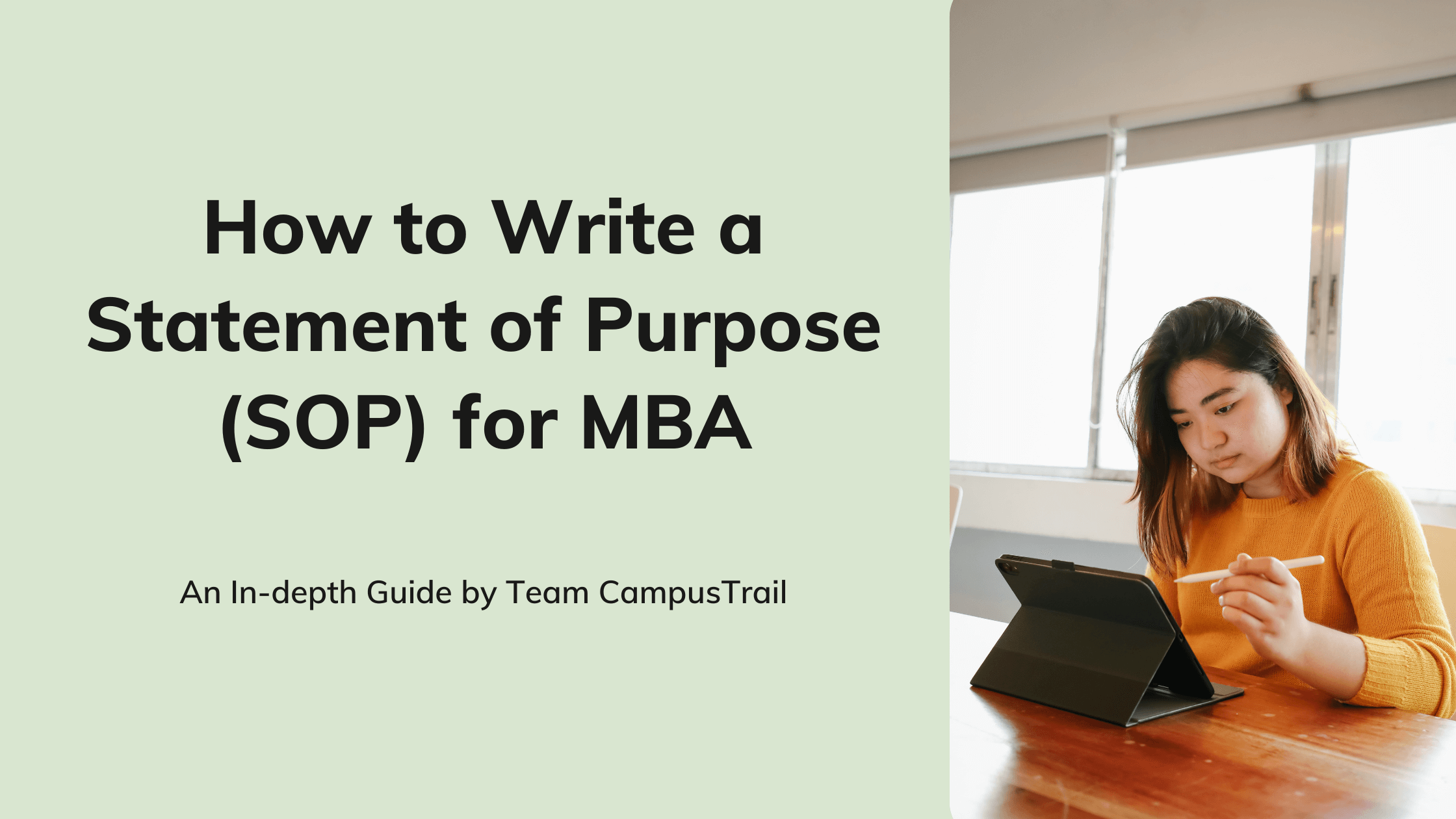When you are applying to study at an overseas university, perhaps one of the most pivotal documents is your Statement of Purpose or SOP. It is a document that accompanies your application and briefs the admissions committee about your educational and professional background, achievements, and goals—a small ‘get to know me’ if you will. Not to be confused with a professional resume, an SOP is more detailed; it highlights your experiences and conveys how you can be a good fit at the university. Although every aspect of your application is inspected before finalizing a decision, your Statement of Purpose can be the difference between getting accepted or rejected and, hence, needs utmost attention.
Table of Contents:-
- What is an SOP for MBA?
- What is the Difference between an SOP for MS and an SOP for MBA
- What you should include in your SOP for MBA
- What you shouldn’t include in your SOP for MBA
- Bonus: Format for an MBA SOP
- Final Thoughts
- Frequently Asked Questions
What is an SOP for MBA?
Universities generally expect MBA applicants to hold relevant work experience, and thus the SoP for an MBA program typically runs heavy on details. Since there are learnings to be drawn from, the SoP needs to be thorough and insightful, while successfully reflecting your personality and putting forth your abilities to enrich the university’s pre-existing culture.
While your academic documents can provide a good look at your ability to grasp course material, your SoP ties everything together. It is the only part of your application that is truly subjective in nature and carries the potential of leveraging low test scores by allowing you to communicate with the admissions committee and express your true self. The document is a gist of instances that have motivated you, your aspirations, and the university’s role in actualizing those aspirations.
What is the Difference between an SOP for MS and an SOP for MBA?
While it might seem that the Statement of Purpose for an MS and an MBA program can be identical, the approaches are different in nature. In order to distinguish between the two, it is essential to consider what is expected from the applicant’s profile in each program. The SoP for an MS program is more technical, whereas MBA applicants are expected to have industry experience as mentioned above.
Hence, the SOP has to portray their academic learnings accurately and its effectuation in the technical roles they have partaken in, showcasing their professional maturity.
Here’s what you should include in your SOP for MBA:
1. Interest
More often than not, universities tend to accept only those applicants who exhibit confidence and are likely to thrive in the challenging environment of an MBA program. Therefore, it is necessary to express your passion and zest towards the subject; show the committee why you want to pursue the program.
Additionally, it is always a good idea to explain how the program fits into your career path. Why are you explicitly applying this year? What changed? How does this degree help you with your career goals? Voice your motives.
2. Details about the college
If there’s one thing that can make your SoP stand out, it’s research. Though the degree is essentially the same, every university offers something unique along with it. Try and include details about the program—find out what makes the university special, if there’s any faculty or student organization you’re particularly keen on engaging with, mention it. Show that you are already putting in an active effort towards being a part of the community.
You are likely applying to more than one school; make sure that your SoP is personalized according to each university. The more specifications you include, the better it demonstrates that you’ve done your homework.
3. How you fit in
Perhaps a university is more inclined towards non-profit organizations and encourages internship opportunities pertaining to those, while your orientation lies in climbing the corporate ladder—it is important to know about the values and the vision of the college you’re applying to beforehand. Once you’re confident that you can fit into the environment the university offers, you can enhance your SoP by mentioning the qualities you possess that are in alignment with the university’s culture.
4. Your goals
The success of alumni plays a vital role in the legacy of a university. It aids in global rankings, admission rates and even sponsorships. In addition to MBA being a challenging course to get into, universities have to ponder over their prestige and as a result, seek those candidates who display a knack for the subject and are sincere about their future.
Mention your short-term and long-term goals; specify your plans immediately after obtaining an MBA, and where you see yourself decades later. By doing so, you are sharing your vision with the admissions committee. While it is encouraged to be ambitious, be mindful of balancing the reality of circumstances too.
5. Concise writing
Lastly, an important thing to remember is to keep your SoP concise. Eliminate any information that isn’t relevant to your career goals, or doesn’t aid in showcasing your personality.
Adhere to the university’s guidelines and make sure that you are specifying concrete information that directly aligns with your career goals. To ensure a better flow of writing, try and correlate the endings and beginnings of succeeding paragraphs.
Here’s what you shouldn’t include in your SOP for MBA:
1. Exaggeration
Never lie or exaggerate in your SoP, the admissions committee will see right through it. If you’ve been through setbacks, embrace it, share how your downfalls have helped you stand back up. If you think you might not be able to stand out from the dozens of applicants, that’s okay too, stay true to yourself and let your SoP speak for itself.
2. The same details in your resume
One of the most common mistakes applicants make is by including the same things mentioned in their resume. While specifics about your academic and professional background will be present on both the documents, your SoP should supplement the information that you normally wouldn’t find in a resume. The key is to go deeper into details by bringing up what you learnt from each experience and how it has helped you advance as an individual.
3. Plagiarise
The biggest ‘no’ when it comes to writing a Statement of Purpose is plagiarising. If you aren’t confident with your vocabulary or writing skills, ask your friends, family or colleagues for assistance. You can even hire a professional service for the same but never resort to plagiarising. It will completely diminish your chances at the university and serve as a poor judge of character.
Bonus: Format for an MBA SOP
A universally accepted SoP format is followed, and the same should be kept in mind when drafting one.
- Font: Times New Roman
- Font size: 12 pt.
- Word count: Unless particularly specified by the college you’re applying to, the general word count should approximately be 1000 words.
- Line spacing: 1.5
- Alignment: Barring the title ‘Statement of Purpose’ at the beginning of the document, all your text should be justified. Justification is a common type of text alignment where the spaces between words are stretched or compressed in order to align both the left and right ends of consecutive lines of text.
Here are some SOP Writing Resources for other courses
| COURSE NAME | RESOURCE |
|---|---|
| MBA in Marketing | Statement of Purpose (SOP) for MBA in Marketing |
| MBA in Information Systems | Statement of Purpose (SOP) for MBA in Information Systems |
| MBA in Human Resource | Statement of Purpose (SOP) for MBA in Human Resource |
| MBA in Supply Chain Management | Statement of Purpose (SOP) for MBA in Supply Chain Management |
| MBA in Finance | Statement of Purpose (SOP) for MBA in Finance |
| MBA in Operations Management | Statement of Purpose (SOP) for MBA in Operations Management |
| MBA in General Management | Statement of Purpose (SOP) for MBA in General Management |
Final Thoughts
Statement of Purpose is the only document in your application that allows you to showcase your uniqueness, to prove that you deserve the chance to be a part of your desired university. In addition to making you stand out from the dozens of applications colleges receive regularly, an SoP is your best chance to showcase that your GPA isn’t merely a representation of who you are, but just a small part of your journey to your dreams. By emphasizing your extracurriculars, portraying your enthusiasm, and characterizing your personality, your SoP can earn you an acceptance letter.
While the thought of being mindful to each guideline and delivering the perfect Statement of Purpose that stands out might seem overwhelming, don’t worry—there’s a team of expert writers just for you. At CampusTrail, we are dedicated to bringing you a step closer to your dreams. A collaborative venture of pioneers in abroad education counselling services, CampusTrail’s paramount objective is to erase the stigma prevalent in Indian society concerning abroad studies. We believe that with the right guidance, a strong profile and an excellent professional acumen in your respective field of study, nothing can hold you back.
If you are interested in getting a professional SOP, please fill up the form below.
Frequently Asked Questions (FAQ):-
1. How many words are recommended for writing SOP for MBA?
The recommended word count lies between 500-1000 words.
2. How important is the Statement of Purpose (SOP) for MBA with respect to the admissions committee?
An SoP is the applicant’s chance to communicate with the admission’s committee directly and express the importance of enrolling in that particular university. Although applications are inspected thoroughly before finalizing a decision, a Statement of Purpose can be the line between getting accepted or rejected and is hence one of the most important documents.
3. Should your statement of purpose for MBA have a title?
Your SoP should have “Statement of Purpose” written at the beginning of the document, underlined and in bold, aligned in the page’s centre. No other title apart from this is advised.
4. Should I hire a professional company for writing my statement of purpose (SOP)?
There are plenty of guidelines on writing an SoP available on the internet, but it can be exhausting to remember them all, while also successfully reflecting your personality. With the help of a professional company, like CampusTrail, you sign up for a hassle-free service. Our team of writers are experts in the field and are very well-equipped with the universally followed SoP writing guidelines.





![Read more about the article List of Best 5 SOP Writers in Chandigarh [2022 Updated]](https://thecampustrail.com/wp-content/uploads/2022/04/Work-From-Home-Freelance-Blog-Banner-37-300x169.png)
![Read more about the article SOP For MS in Psychology [Format & Sample SOP – 2022]](https://thecampustrail.com/wp-content/uploads/2022/02/White-Minimalist-More-Productive-From-Home-Blog-Banner-300x169.png)